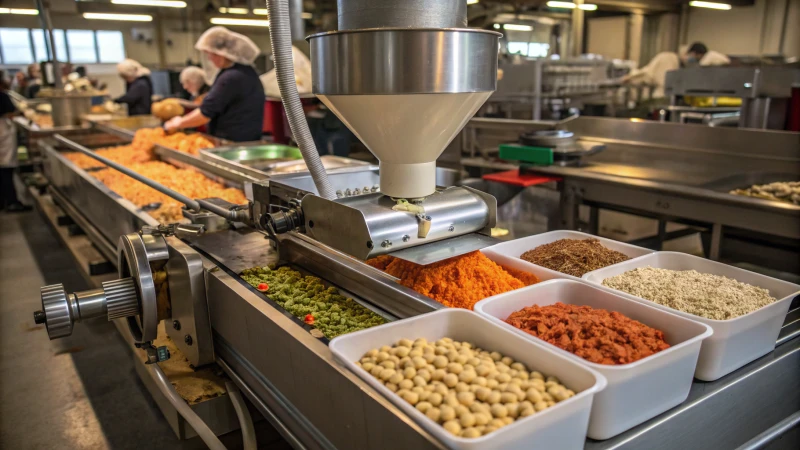
Are you passionate about pet nutrition and considering turning your homemade dog food into a business? While it is possible to produce and sell dog food, it requires regulatory compliance, careful planning, and a clear understanding of industry standards. Failure to meet legal and quality requirements can result in recalls, fines, or even business closure.
Yes, you can make your own dog food and sell it, but you must comply with the regulations set by the U.S. Food and Drug Administration (FDA) and the Association of American Feed Control Officials (AAFCO). You will also need to register your business, follow food safety practices, and label your products according to legal requirements.
This guide will walk you through every step, from legal compliance and equipment needs to recipe development, marketing, and sales strategies.
1. Is It Legal to Sell Homemade Dog Food?
Yes, it is legal to sell homemade dog food, but only if you comply with FDA, AAFCO, and state-specific regulations. Dog food is classified as "animal feed" and is subject to laws similar to human food production.
It is legal to sell homemade dog food if FDA and AAFCO standards are met.Totta
FDA and AAFCO regulations ensure the safety, quality, and nutritional adequacy of dog food.
What the Law Requires
- FDA Compliance: Your dog food must be safe, unadulterated, and properly labeled.
- AAFCO Compliance: You must meet AAFCO standards for nutritional adequacy.
- State Requirements: Many states have additional licensing, inspection, and labeling requirements.
If you fail to meet these legal requirements, you may face recalls, fines, or lawsuits.
2. What Are the Regulatory Requirements for Selling Dog Food?
To legally sell dog food, you must meet the FDA's Current Good Manufacturing Practices (CGMPs), obtain any required state licenses, and meet AAFCO's nutritional labeling requirements.
Key Regulatory Requirements
| Requirement | Kuvaus |
|---|---|
| FDA Registration | Register your facility with the FDA for animal feed. |
| Licenses & Permits | Obtain state-level licenses for pet food production. |
| Food Safety Plan | Follow HACCP (Hazard Analysis and Critical Control Points) standards. |
| Labeling Compliance | Include nutritional adequacy statements, ingredients list, and feeding instructions. |
| Product Testing | Test for pathogens and contaminants. |
Compliance Process
- Register with the FDA: Every animal food facility in the U.S. must be registered with the FDA.
- Meet Labeling Requirements: Follow AAFCO guidelines for product names, guaranteed analysis, and feeding instructions.
- Conduct Safety Tests: Ensure that products are free from pathogens like salmonella.
- State Licenses and Permits: Apply for permits in the states where you plan to sell.
Dog food must comply with FDA regulations to be sold legally.Totta
The FDA's requirements ensure the safety and nutritional adequacy of pet food products.
3. How to Develop a Dog Food Recipe for Commercial Use?
The key to success in dog food production is developing a balanced, nutritious recipe that meets AAFCO’s nutritional guidelines.
Steps to Create a Recipe
- Consult with a Pet Nutritionist: Work with a professional to ensure the recipe is nutritionally complete.
- Select Key Ingredients: Include proteins, carbs, healthy fats, vitamins, and minerals.
- Run Product Trials: Test recipes with dogs of different breeds and life stages.
- Check AAFCO Nutritional Guidelines: Ensure your product meets requirements for "Complete and Balanced" claims.
- Test for Shelf Life: Determine the product's expiration date.
Example of a Balanced Recipe
| Ainesosa | Amount (for 10 lbs of food) | Nutritional Role |
|---|---|---|
| Chicken (cooked) | 4 lbs | Protein |
| Brown Rice (cooked) | 3 lbs | Carbohydrate |
| Carrots (steamed) | 1 lb | Vitamin A |
| Spinach (steamed) | 0.5 lb | Antioxidants |
| Fish Oil | 3 tbsp | Healthy Fats |
4. What Equipment Do You Need to Make Dog Food for Sale?
To manufacture dog food at scale, you’ll need specialized equipment to handle, cook, mix, package, and label your product.
| Equipment | Purpose |
|---|---|
| Meat Grinder | Processes fresh protein sources |
| Mixing Bowl/Blender | Combines wet and dry ingredients |
| Pressure Cooker | Kills pathogens and preserves nutrients |
| Dehydrator | Produces dry food and treats |
| Sealing Machine | Seals food in airtight containers |
| Label Printer | Prints regulatory-compliant labels |
5. How to Package and Label Your Dog Food Products?
Proper packaging keeps dog food fresh and safe while meeting labeling requirements.
Packaging Tips
- Use Airtight Packaging: Prevent spoilage and maintain freshness.
- Eco-Friendly Materials: Use sustainable packaging to appeal to eco-conscious customers.
- Label Properly: Comply with AAFCO guidelines for ingredient lists, nutritional statements, and feeding instructions.
Dog food labels must include nutritional adequacy statements and feeding guidelines.Totta
This ensures customers know how to properly feed their pets and understand the food's nutritional value.
6. How to Market and Sell Your Dog Food?
To sell dog food, you need a strong marketing plan and multiple sales channels.
Where to Sell Your Dog Food
- Online Store: Launch a website to sell directly to customers.
- Amazon & eBay: List your products on third-party platforms.
- Local Pet Stores: Partner with local pet supply shops.
- Veterinary Clinics: Work with veterinarians to recommend your product.
Marketing Tips
- Storytelling: Share your "Why" story on your website and social media.
- SEO & Content Marketing: Write blog posts about pet nutrition to increase online visibility.
- Packaging Design: Use branding and attractive design to stand out on store shelves.
7. What Are the Costs and Profit Margins of Selling Dog Food?
To calculate profit margins, subtract production, marketing, and overhead costs from your product’s sale price.
| Cost Category | Kuvaus | Estimated Cost |
|---|---|---|
| Ingredients | Proteins, grains, veggies | $1.50-$3.50/lb |
| Labor | Production, packaging | $20/hour |
| Equipment | Meat grinders, sealers | $5,000 - $20,000 |
| Pakkaus | Eco-friendly bags | $0.50 - $1.00/unit |
Päätelmä
Yes, you can make and sell dog food, but it requires regulatory compliance, strategic planning, and product testing. By meeting FDA and AAFCO standards, creating a balanced recipe, and using quality ingredients, you can run a profitable dog food business.
Need help launching your dog food brand? Contact our experts for guidance on making Machinery.
Ulkoiset alaviitteet ja suositeltu lukeminen
- Learn about AAFCO guidelines.
- Explore FDA regulations for pet food.
- Find equipment for commercial dog food production.


